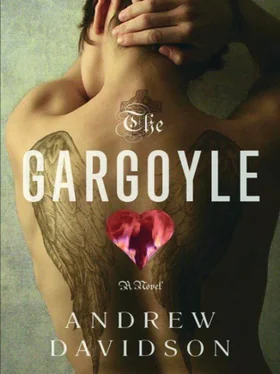At the end of their evening, Sayuri agreed to eat dinner with Gregor at Rasputin’s on the following weekend.
· · ·
Marianne Engel pushed my wheelchair into a room where a large group of interns was waiting. Sayuri introduced me to everyone and then asked a seemingly innocent question: “What is my job?”
The interns looked to each other, sensing a trick. A young man in the back suggested, obviously, that Sayuri was a physical therapist. Her ever-wide smile spread ever wider as she shook her head. “Today I’m a tailor. These measurements are extremely important, because the suit we’re making will be worn twenty-four hours a day, for a year.”
She pulled out a tape measure and asked who wanted to help. Two interns stepped forward and were soon laying out scraps of fabric, the kind used to make pressure garments, along the contours of my body. The work took longer than I expected, mostly because they were so unsure of themselves. Sayuri patiently dealt with all their questions and it was obvious that not only was she a good teacher, she enjoyed it as well. When the measurements were finished, she was glowing as she exclaimed that what came next-making the first impression for the plexiglass mask I’d need to wear-was far more challenging.
“Most of his head surgeries have already been performed and the swelling in his face has subsided, so the primary function of the mask is to minimize scarring. What do we do first?”
“We make a negative impression of the face,” answered one of the students.
“Nope,” Sayuri said, holding up a camera. “We take photographs for reference when we’re preparing the inside of the mask. How would you like to wear a mask for a year if it didn’t fit properly?”
Sayuri took the pictures herself, shooting from all angles to capture every nuance of my face. I hated that she was making a permanent record of how I looked. When she put the camera down, she said, “ Now it’s time for the impression. What do we do first?”
At least one student had read the correct chapter in the book. “We pour GelTrate over the face, and then we lay on plaster strips.”
“Excellent. You come help.” Sayuri pulled a white sheet off a nearby table; underneath were all the materials necessary for the job. Little circles of cloth were placed over my eyes, and small tubes were put into my nostrils so that I could breathe. The students applied the first squirts of GelTrate into their hands and began spreading it around my face. “This is the same material that’s used to take dental impressions. It’s good to remember that, because no one likes that stuff. Be gentle when applying it.”
The intern’s fingers were tentative, compared with Sayuri’s, but she praised him anyway, and then she asked a few others to “step forward and give it a go.” The feeling of so many hands touching me was overwhelming. Sayuri kept explaining as they worked, “It’s important that we get the natural shape of the head, the cheekbones, around the eyes… Remember to be gentle…”
After the GelTrate came a neck splint to hold me steady as the interns laid the strips of plaster into place. Sayuri instructed them on the proper angles, occasionally smoothing out a mistake but mostly just reminding them to take care. “This is not only skin, it’s burnt skin. Remember that.”
When the plaster was finally in place, we had to wait for it to harden. Sayuri used this time to answer questions on my recovery; with my head covered in plaster, I was unable to add anything to the conversation. In a whisper, so as not to disturb the students, Marianne Engel suggested that she could read me the final canto of Inferno. The offer pleased me greatly; I wanted to hear her voice in the darkness.
She began:
“On march the banners of the King of Hell,”
my Master said. “Toward us. Look straight ahead:
can you make him out at the core of the frozen shell?”
Satan, the King of Hell, trapped in a frozen shell in the very bowels of the Inferno: how fitting an image, I mused, as I lay wrapped in my own shell of plaster. Dante’s master was Virgil, leading him ever forwards, while my guide was Marianne Engel. She slipped twice into the Italian, catching herself and laughing before reverting to English. In the background were the muffled voices of the interns, still learning about the tribulations of burn treatment. When Sayuri decided it was time to remove the mask, I could feel her fingers peeling away the plaster. Just as I was reintroduced to the room’s light, Marianne Engel read Dante’s final line softly into my better ear:
…And we walked out once more beneath the Stars.
· · ·
“Only wear short-sleeved white cotton shirts,” Dr. Edwards said, “and run them through the laundry cycle a few extra times with only water. Soap residue is horrible for healing skin.”
I was scheduled to leave the hospital; I had made such good progress that I was being released in mid-February, almost two months earlier than expected. Nan pointed towards the thick book of rehabilitation instructions in Marianne Engel’s hands. “The tub needs to be sterilized before every bath, and chemicals added to the water. The list of chemicals is in the book. We’ll give you enough for the first week, but then you’ll have to buy your own. There’s also a list of appropriate soaps. Don’t forget to apply the salves after bathing, and then apply new bandages. Your pressure garments will be ready in about a month, but until then it’s still bandages. Oh, and if you used cologne or deodorant before the accident, they’re absolutely forbidden now.”
“Anything else?” asked Marianne Engel.
Nan thought for a moment. “Be careful of insects. A sting can result in a nasty infection. There aren’t any insects in your house, are there?”
“Of course not,” Marianne Engel said, before adding, “but one of my friends was stung by a wasp once and was mistaken for dead. It was horrible.”
There was a pause in the conversation as both Dr. Edwards and I tried to figure out what Marianne Engel was talking about. We looked at each other and came to an unspoken agreement that to ask would be futile, so Nan simply commented that anaphylactic shock is certainly common in such cases and continued her instructions on my care. She reminded me to pay as much attention to hidden damage as to that which was readily apparent. Skin is the organ that regulates body temperature, releasing excess heat through sweat on a hot day or during exercise, and my body had lost much of that ability. Because of the damage to my sweat glands and pores, my brain would face severe challenges in managing the nervous and endocrine controls. Theoretically, my body could revolt and fry itself from the inside out; if I didn’t take care, I might become my own spontaneous human combustion.
“We’ve kept things at a good temperature for you here in your room,” Dr. Edwards said, “but you’ll probably have to play with the air conditioning to find what works. You do have air conditioning, don’t you, Marianne?”
“I’ll get it installed as soon as possible.”
“Good. Any final questions?”
I asked how much morphine they would provide. (I was certain that the bitchsnake wouldn’t slither out of my spine as I exited the hospital.)
“A month’s worth,” Nan answered, “but be careful. A little pain now is better than going through life as an addict. Do I make myself understood?”
“Of course,” I said. But I was THIRSTYthinking about my next delicious dose.
Now that the treatment instructions were completed, I was placed into a wheelchair, in keeping with hospital policy, and Nan pushed me to the front door. Marianne Engel didn’t even protest that she should be the one pushing; perhaps she thought that Dr. Edwards needed to do it for her patients, as a ritual to let them go.
Читать дальше











